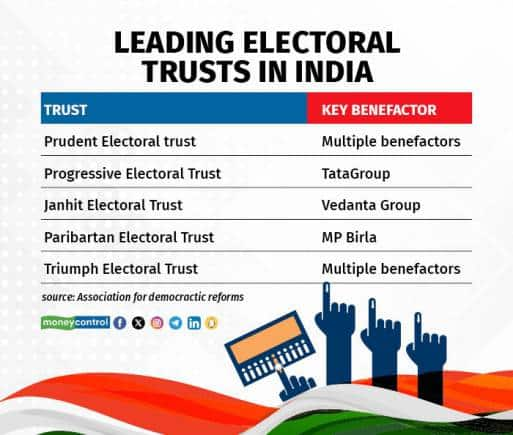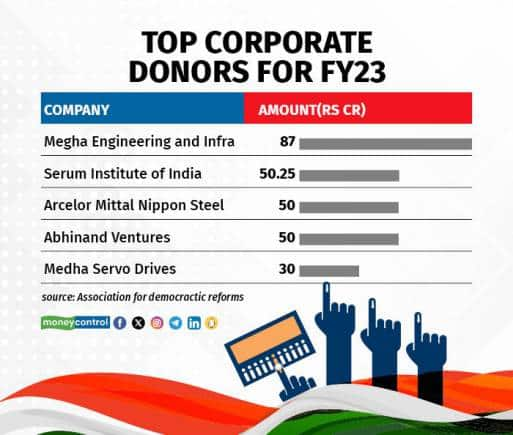



Indian companies are likely to revert to electoral trusts to make political donations following the landmark Supreme Court verdict striking down the electoral bonds scheme, experts said.
Since 2018, many companies have turned to electoral bonds to make political contributions, but with the scheme now invalidated, they could return to using trusts for such donations.
Trusts allow companies to maintain arm’s length while donating to political parties, at least in terms of perception. This is because trusts are supposed to be independent of the companies that create them under the law.
 Leading Electoral Bonds Trusts in India
Leading Electoral Bonds Trusts in India
While there are no restrictions on companies making donations directly, they tend to avoid taking the route since the details of the donation are on the company’s records, which legal experts say may draw unwanted scrutiny and increase political risk exposure.
ALSO READ: SC electoral bonds order levels the playing field, say bankers, legal experts
“Showing political affiliations in a balance sheet increases risks of the company,” said Jidesh Kumar, managing partner of law firm King, Stubb & Kasiva. “Making donations via electoral trusts can act as a catalyst for growth, while making direct contributions may prove to be an impediment for the companies.”
In 2013, the United Progressive Alliance (UPA) government allowed the setting up of electoral trusts under Section 25 of the Companies Act, 1956, to establish electoral trusts. These trusts enable the pooling of funds, allowing multiple companies or entities to make political contributions through a single trust. “The electoral trust structure allows companies to distance themselves from the decisions of the trust, which is expected to independently decide on donations to political parties of choice,” said the CEO of a leading financial services company who declined to be named. “This allows a certain degree of plausible deniability to the donor in adverse political outcomes,” he added.
According to Election Commission of India (ECI) data, there are 18 electoral trusts in India, some of which count large corporate houses as their biggest donors.
For instance, billionaire Anil Agarwal’s mining conglomerate Vedanta Ltd donated Rs 155 crore to political parties through electoral bonds in the year ended March 2023, according to the company’s latest annual report.
 Top Corporate Donors for fiscal 2023
Top Corporate Donors for fiscal 2023
According to a report by the Association for Democratic Reforms (ADR), Megha Engineering & Infrastructures contributed Rs 87 crore, the highest among corporates, in political funding through electoral trusts during 2022-23. Serum Institute of India was the second-highest contributor with Rs 50.25 crore, followed by ArcelorMittal Nippon Steel India at Rs 50 crore.
The report further said that the top 10 corporates donated Rs 332.26 crore to electoral trusts, making up 90.66% of total donations. However, compared to electoral bonds, through which Rs 16,500 crore has gone to political parties since 2018, the share of electoral trusts is minuscule. Experts said this may change with the top court order.
“Electoral trusts undoubtedly offer more transparency, and they should be brought back in a major fashion,” said Alay Razvi, a partner at law firm Accord Juris LLP.
Discover the latest Business News, Sensex, and Nifty updates. Obtain Personal Finance insights, tax queries, and expert opinions on Moneycontrol or download the Moneycontrol App to stay updated!
Find the best of Al News in one place, specially curated for you every weekend.
Stay on top of the latest tech trends and biggest startup news.